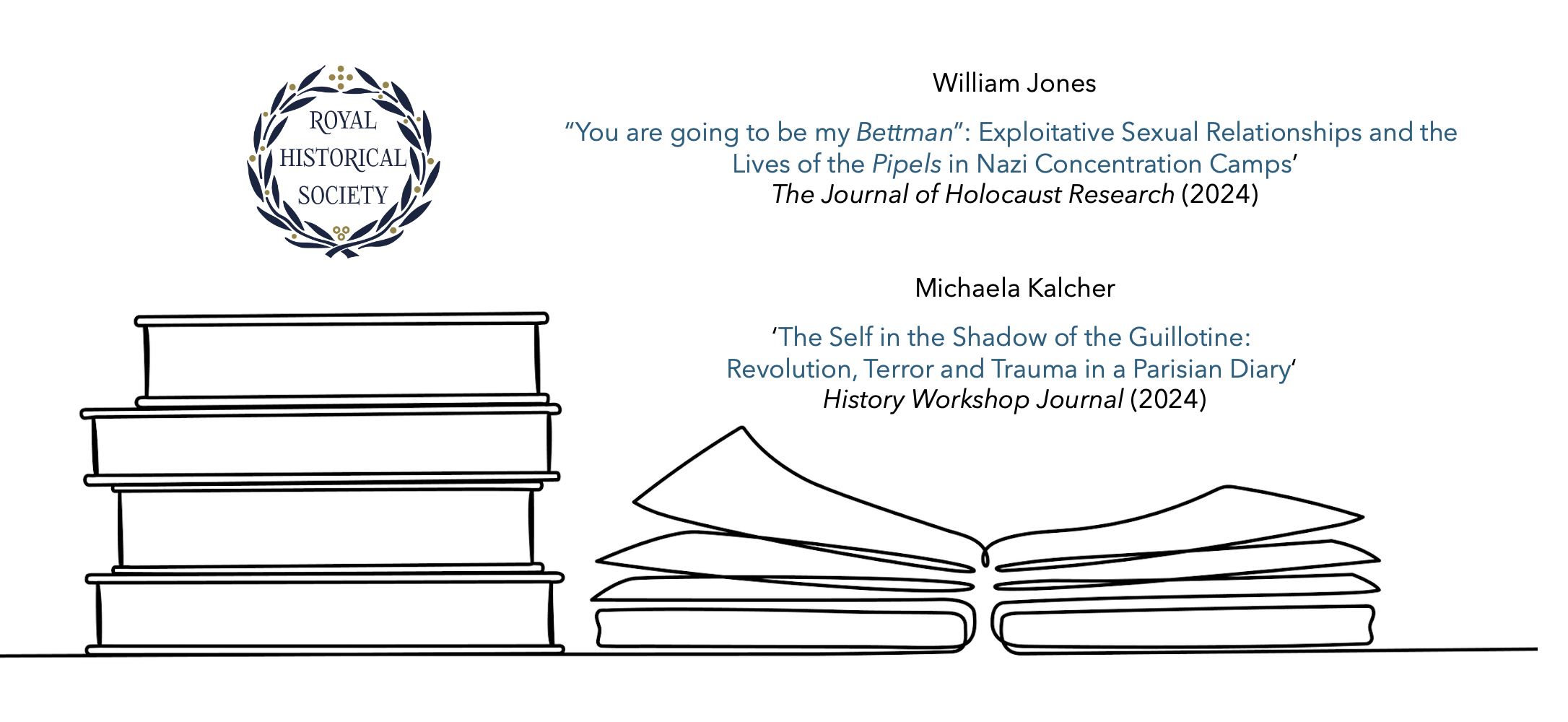
The RHS Early Career Article Prize is awarded for an essay or article based on original historical research, by a doctoral candidate or an early career historian within three years of being awarded a doctorate, published in a journal or an edited collection of essays.
Two prizes of £250 each are awarded annually.
2025 Winners

On 2 July 2025, the Society announced the following two winners of this year’s Early Career Article Prize:
- William Jones, “You are going to be my Bettman”: Exploitative Sexual Relationships and the Lives of the Pipels in Nazi Concentration Camps’, published in The Journal of Holocaust Research (2024)
- Michaela Kalcher, ‘The Self in the Shadow of the Guillotine: Revolution, Terror and Trauma in a Parisian Diary‘, published in History Workshop Journal (2024)
Our congratulations to William and Michaela, and to the six other authors shortlisted in 2025. For more on the winning titles, please see below.
Eligibility for the RHS Early Career Article Prize, 2026
To be eligible for consideration for the prize:
- applicants must be doctoral students in a historical subject at a UK or Irish institution, or be within three years of having a submitted a corrected thesis in a historical subject in a UK / Irish institution at the time of the closing date for entries.
- the article or essay must have been published in a journal or edited collection during the calendar year 2025 for the 2026 prize round. Advanced access publisher versions are also eligible, but an item cannot be entered more than once in subsequent years.
- an electronic copy of the publisher’s version the article or essay will need to be uploaded to the entry form.
Submitting your article for the prize, 2026
For 2026, entries for the RHS Early Career Article Prize remain via self-nomination by the author. The process for submission is as follows:
- eligible authors whose article / book chapter qualifies for the 2025 prize should submit an application via the RHS applications platform (open from 1 September 2024 to 31 December 2025). At this stage, applicants will be asked to provide the publisher’s version of the article as a pdf. The call for nomination of books will open on 1 September 2025 and close on 31 December 2025.
- all submissions will then be reviewed by the judging panel to create a long-list from February 2026.
- judging then takes place leading to the creation of a Shortlist of six articles, from which two final winners of the RHS Early Career Article Prize will be chosen. The award of the next round of article prizes is expected to occur in July 2026.
RHS Early Career Article Prize Winners, 2025

Congratulations to William Ross Jones and Michaela Kalcher who are the co-winners of the 2025 prize.
- William is the author of “You are going to be my Bettman”: Exploitative Sexual Relationships and the Lives of the Pipels in Nazi Concentration Camps’, published in The Journal of Holocaust Research (2024)
- Michaela is the author of ‘The Self in the Shadow of the Guillotine: Revolution, Terror and Trauma in a Parisian Diary‘, published in History Workshop Journal (2024)
Judges’ citation for William Ross Jones’s article:
William Jones’ work on everyday life in the concentration camps concerns the issue of sexual violence and consent (or the lack thereof) between adult male prisoners and boys. The article uses survivor narratives to investigate a complex history of trauma and highlights power structures within the prisoner population itself. Despite the extensive historiography of the Holocaust, Jones has found something new and important to say.
The judges were impressed by Jones’ ability to create a highly nuanced history of daily life in the concentration camps. This is a groundbreaking and sensitive study of sexual violence against boys during the Holocaust. It balances theoretical nuance with survivor testimony, offering a new conceptual framework (“exploitative sexual relationships”) that is both meaningful and analytically sharp.
Dr Helen Paul, chair, Early Career Article Prize, 2025
Judges’ citation for Michaela Kalcher’s article:
Michaela Kalcher’s article considers how trauma shaped an individual’s recollection of the bloody events of the French Revolution. Kalcher contributes to the emerging literature of the history of the self and the emotions. She focuses on one primary source, the diary of a little-known man who was a bystander to great events. By reading this apparently unpromising material against the grain, Kalcher was able to show how the diarist’s lack of obvious emotion was itself a product of trauma.
The judges felt that Kalcher brought an exciting and novel approach to a previously under-utilised source. The article is a beautifully written, psychologically rich analysis of trauma, identity, and diary writing during the French Revolution. It combines microhistory with theoretical depth and offers a compelling model for reading emotion and selfhood in historical texts. The panel felt that Kalcher’s article would become a key part of the historiography of the French Revolution as it was so thought provoking and cleverly constructed.
Dr Helen Paul, chair, Early Career Article Prize, 2025
- A full listing of previous winners of the Royal Historical Society’s article prizes, previously known as the Alexander Prize (1898-2025) is available here.
General enquiries about Society’s Prizes should be sent to: administration@royalhistsoc.org.
IMAGE: ‘Specimens of Penmanship after Jan van de Velde and other Calligraphy Books, Conrad Baumann’, c. 1620, Metropolitan Museum of Art Collections, public domain
